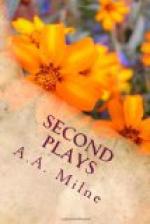We can now pass on safely to the plays in this volume.
We begin with a children’s play. The difficulty in the way of writing a children’s play is that Barrie was born too soon. Many people must have felt the same about Shakespeare. We who came later have no chance. What fun to have been Adam, and to have had the whole world of plots and jokes and stories at one’s disposal. Possibly, however, one would never have thought of the things. Of course, there are still others to come after us, but our works are not immortal, and they will plagiarise us without protest. Yet I have hopes of Make-Believe, for it had the honour of inaugurating Mr. Nigel Playfair’s management at the Lyric, Hammersmith. It is possible that the historians will remember this, long after they have forgotten my plays; more likely (alas!) that their history will be dated A.D. (After Drinkwater) and that the honour will be given to “Abraham Lincoln.” I like to think that in this event my ghost will haunt them. Make-Believe appeared with a Prologue by the Manager, lyrics by C.E. Burton, and music by Georges Dorlay. As the title-page states that this book is, in the language of children’s competitions, “my own unaided work,” I print the play with a new Prologue, and without the charming lyrics. But the reader is told when he may burst into an improvisation of his own, though I warn him that he will not make such a good show of it as did my collaborators.
Mr. Pim Passes By appeared at several theatres. Let us admit cheerfully that it was a success—in spite of the warning of an important gentleman in the theatrical world, who told me, while I was writing it, that the public wouldn’t stand any talk of bigamy, and suggested that George and Olivia should be engaged only, not married. (Hence the line, “Bigamy! . . . It is an ugly word,” in the Second Act.) But, of course, nobody sees more clearly than I how largely its success was due to Mr. Dion Boucicault and Miss Irene Vanbrugh.
The Romantic Age appeared first at the Comedy, and (like Mr. Pim) found, in its need, a home at The Playhouse. Miss Gladys Cooper has a charming way of withdrawing into a nursing home whenever I want a theatre, but I beg her not to make a habit of it. My plays can be spared so much more easily than she. By the way, a word about Melisande. Many of the critics said that nobody behaved like that nowadays. I am terrified at the thought of arguing with them, for they can always reduce me to blushes with a scornful, “My dear man, you can’t do that in a play!” And when they tell me to remember what Strindberg said in ’93 (if he were alive then; I really don’t know) or what Aristotle wrote in—no, I shan’t even guess at Aristotle, well, then, I want to burst into tears, my ignorance is so profound. So, very humbly, I just say now that, when Melisande talks and behaves in a certain way, I do not mean that a particular




